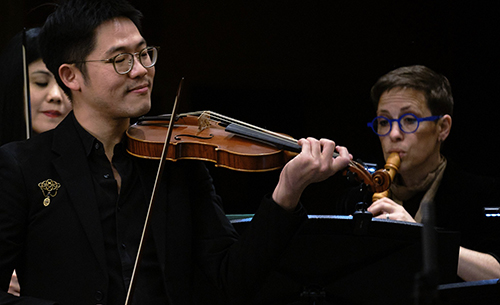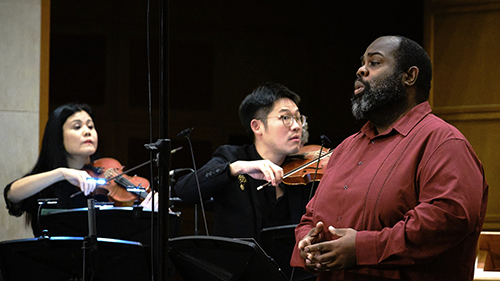by Daniel Hathaway

Featuring the formidable vocal gifts of countertenor Reginald Mobley, the program managed to gather under a single banner an orchestral suite and other selections by Henry Purcell, lute music by John Dowland, a suite by John Eccles, and an aria from J.S. Bach’s “Hunting” cantata as well as his solo cantata Ich habe genug. The well-attended concert ended with Spirituals that fit remarkably well into a menu of music played on period instruments.
In his director’s notes, Alan Choo wrote that this program “epitomizes the universality of music and its ability to uplift, heal, and revitalize the human spirit,” quoting the text of 17th-century Anglo-Welsh royalist poet Katherine Phillips’ O Solitude as set by Henry Purcell.
Oh, how I solitude adore!
That element of noblest wit
Where I have learned Apollo’s lore
Without the pains to study it.
After the ensemble played Purcell’s Suite from The Gordian Knot Unty’d (an overture and tunes from each of the four acts of a play for which only the music survives) and his regal Three Parts on a Ground, a theorbo solo led into Mobley’s evocative singing of O Solitude accompanied only by continuo instruments. His pure voice that shows no breaks in register and the perfect diction of a born storyteller promised wonderful things to come later in the program.
A beautifully styled arrangement of John Dowland’s Fortune my foe for two lutes played by Brandon Acker and William Simms and a swaggering performance of the Earl of Essex Galliard paved the way for another Restoration theatrical suite, this one from John Eccles’ The Mad Lover demonstrating a pervasive British melancholy. Again, the whole ensemble got into the act, Choo and Debra Nagy trading jovial violin and oboe lines, and Choo setting up a final Jigg.
The scenario changed completely after intermission with an arrangement of Pales’ aria from J.S. Bach’s Cantata 208, Was mir behagt, best known as “Sheep may safely graze.” After hearing it in so many arrangements, it was a treat to revisit the original orchestration for two recorders (Daphna Mor and Debra Nagy) and continuo (Jeannette Sorrell at the harpsichord), but with the vocal line played by solo cello (Sarah Stone).

At the beginning of the opening movement, Bach intertwines florid violin and oboe lines over an undulating accompaniment before the solo voice joins the ensemble to sing of Simeon’s desire to depart this life after holding the Savior in his arms.
Mobley’s interpretation was pure magic in the middle aria, which Bach borrowed from himself — or rather from the Notebook for Anna Magdalena Bach. After contrasting sections where he showed the beauty of his lower register, he adroitly snuck back into the main theme several times, sometimes sotto voce.
In the final aria, Ich freue mich auf meine Tod, Mobley and the instrumentalists set a brisk tempo and locked into a tight ensemble that never unravelled.
Not so far as it might seem from the sentiments expressed in Ich habe genug, the program ended with two valedictory Spirituals sung by Reginald Mobley with heartfelt devotion in expressive arrangements by Apollo’s Fire. Wayfaring Stranger and My Lord, What a Morning hopefully sent the audience out into a troubled world armed with the emotional strength to journey to a brighter land.
Published on ClevelandClassical.com November 26, 2024
Click here for a printable copy of this article



